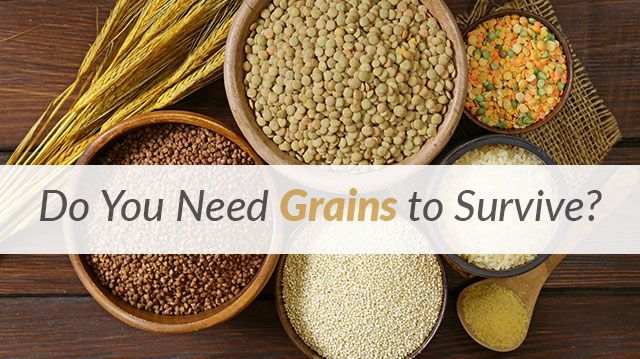
In the face of an ever-growing body of scientific research proving that gluten-containing products are extremely harmful to our health, many people have adopted a gluten-free way of life. This involves cutting out wheat, barley and rye, and any products containing these grains.
With the subsequent loss of these popular grains from their diet, these same people often turn to alternate gluten-free grains to fill the void. Indeed, with a growing community of anti-gluten crusaders, the food industry has sunk its claws into grains that until recently had remained in the starchy shadows of the wheat-barley-rye trifecta. As a result, the market for products such as almond meal, coconut flour and gluten-free baking mixes has flourished, with most people assuming that because these products are gluten-free, they must also be good for us.
What are gluten-free grains?
Grains that are “gluten-free” are numerous, with some of the more common species including:
- millet
- brown rice
- wild rice
- sorghum
- oats
- teff
In addition to these, there is also a subgroup of “pseudograins,” which includes amaranth, buckwheat and quinoa. The term “pseudograin” applies to foods that resemble grains from a human dietary perspective, but from a taxonomic perspective, they actually belong to a different biological group. Where the standard gluten-free grains hail from the cereal family, pseudograins are from a group of broad-leafed plants called dicots.
Whatever their origins, all of the above grains have one thing in common: a lack of gluten.
Are gluten-free grains good for you?
The short answer is no. Sorry, folks. The fact of the matter is that, from a biological perspective, we don’t need grains in order to survive. Humans have evolved without grains, and it is only in the last 12,000 years or so that we have begun to incorporate them into our diet. This is a very short period of time and nowhere near enough time to allow our digestive systems to evolve to the point where they can efficiently process and gain sustenance from grains.
So why, if these grains don’t contain gluten, are they still bad for us? Well, like all other living things, plants are programmed to ensure the survival of their species through the establishment of new generations. In order to do this, many plants use grains to encourage animals to disperse their reproductive capacity (seeds) and allow their offspring to grow away from the parent plant.
Many animals, humans included, eat grains, as they provide valuable starchy energy and (in the right digestive system) ample nutrients. To ensure that the seed contained within the grain is not digested by the animal, plants contain compounds called anti-nutrients, which prevent proper digestion of the grain and allow it to pass through the gut relatively unharmed.
The most troublesome of the anti-nutrients are lectins and phytates. Lectins are sticky proteins that disrupt the digestive process and promote leaky gut due to the fact that our digestive systems don’t realize that they are simple sugars. As a result, your gut allows the lectin proteins to pass through the intestinal wall into your bloodstream, causing inflammation and provoking your body to launch an autoimmune response.
During this process, antibodies tasked with attacking the lectin intruders become confused by their similarity to certain proteins associated with organs in our body, including the pancreas and thyroid gland. As such, these antibodies have been shown to attack your organs, causing all manner of autoimmune diseases, such as hypothyroidism and diabetes.
In addition to the treachery of lectins, gluten-free grains contain phytic acid. Also found in high concentrations in nuts, phytic acid acts as a binding agent within the body, binding to minerals and preventing us from absorbing them. Whatever the nutritional benefits of a grain, you will gain no benefit from them if phytic acid is present. As a result, many people who eat a lot of grains find themselves suffering from severe nutrient deficiency and are plagued with a wide range of other health problems as a result.
Finally, as the icing on the cake, all grains are simple carbohydrates, meaning they break down into sugars very easily in our bodies. This causes a spike in your insulin levels, preventing your body from burning fat and resulting in high blood sugar levels. The follow-on from this is diabetes and obesity. Not much fun.
While gluten-free grains are not all that good for you, it would be a little unrealistic of us to expect you to cut them completely from your diet. As such, only eat them as an occasional treat, and soak or sprout them first if possible. Next time you decide to treat yourself, try this tasty gluten-free bread recipe!
—Liivi Hess
Liivi is an Integrative Nutrition Health Coach and is training to become a doula. She inspires women to find peace and personal power by taking control of health and fertility naturally. Liivi‘s passion is ancestral nutrition and primal lifestyle design. She and her partner Will live between Toronto, Canada and Queenstown, New Zealand.
Sources:
http://www.thelancet.com/journals/laneur/article/PIIS1474-4422(09)70290-X/abstract
http://www.nature.com/ajg/journal/v104/n6/abs/ajg2009188a.html
http://onlinelibrary.wiley.com/doi/10.1111/j.1365-277X.2005.00607.x/abstract?userIsAuthenticated=false&deniedAccessCustomisedMessage=
http://www.sciencedirect.com/science/article/pii/S0924224409002945

